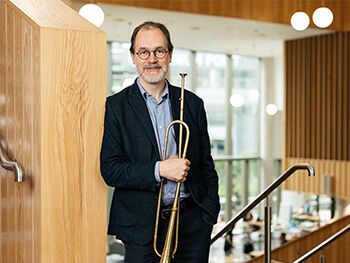University News Last updated 05 June 2025

Professor of Performance-led Research in Music Jamie Savan is proud of the world-leading research environment he is helping to nurture at RBC. This has been achieved by encouraging and supporting our students and colleagues at all stages of their research careers to achieve their full potential, individually and collectively.
What are the core skills or areas of expertise that you bring to RBC?
I am a specialist in historically-informed performance on wind instruments of the Renaissance and early Baroque, particularly the cornett, a leather-covered brass-woodwind hybrid that became the pre-eminent virtuoso wind instrument of the 16th and early 17th Centuries. Performance and research have gone hand in hand throughout my career, and I am privileged to combine both at RBC, where I have also been Director of Research since 2018.
Before coming to BCU, I was Senior Lecturer and Head of Performance at Newcastle University and I also spent more than a decade performing, recording and touring with some of Europe’s leading period instrument ensembles.
What have been your highlights since you started at RBC?
There have been so many since I arrived in 2016, but the things of which I am most proud are supporting my doctoral students through to completion and seeing the impact their research is having not just in the academic field but also as it feeds back into professional practice. One of those former students is Bill Hunt whose work has led to a widely acclaimed series of recordings of English Verse Anthems entitled, In Chains of Gold, the final volume of which will be released later this month on the Signum label.
Another highlight is the project I am currently leading, Aural Histories: Coventry, 1451-1642, in which we are exploring the experience of music in Coventry over nearly two centuries of its turbulent history, through performing and recording within VR reconstructions of its lost performance spaces – most notably St Michael’s Cathedral which was destroyed in the blitz of 1940. The project was developed with Helen Roberts, another of my doctoral graduates, and is funded by a substantial grant from the Arts and Humanities Research Council (AHRC).
What have been the most challenging issues that you’ve had to discuss and take a view on so far?
Without doubt, delivering our return to REF2021 during the pandemic was the biggest challenge. But, with thanks to my terrific colleagues in the research team, we managed to make a strong submission, and I was especially proud that the research environment we have created here was rated as predominantly 4* (world leading).
What are your ambitions for RBC?
These are expressed in our mission statement for research at RBC: To be a world-leading and inclusive centre for music and performing arts research at the heart of a modern, interdisciplinary university. Of this statement, the most important word is ‘inclusive’, which I see as the key to all the rest. This means encouraging and supporting our students and colleagues at all stages of their research careers, so that we can all achieve our full potential, individually and collectively.
What do you like to do outside of the role when you are not working?
I try to keep performing as much as time allows, but I seem to spend most of my non-working life running Dad’s taxi service!